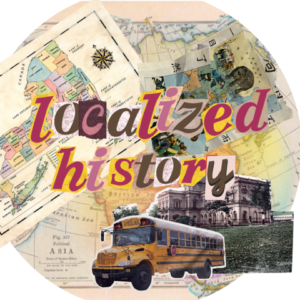
The Localized History Project is a New York State funded youth participatory action research project investigating the extent to which AANHPI history is taught in K-12 history classrooms in NY State, and presenting youth-driven curriculum alternatives to test-driven curricula. Localized History is committed to a community-centered approach, such that the eventual curriculum will be collectively built with intergenerational partners, inclusive of teachers, students, families, and community organizations.
Our project seeks to uplift AANHPI histories, specifically those local to the New York State community. Our work seeks to provide a sense of connection and belonging, challenging the status quo of AANHPIs being perpetually foreign, and to foster solidarities across communities of color. Most importantly, we hope our work showcases how youth are critical contributors to knowledge production, research, and history. Youth driven work matters, and youth driven history classrooms will ensure a more just, inclusive, and accurate curriculum for all.
Follow the Localized History Project on Instagram (@localizedhistory) for updates.
Project Overview and Preliminary Findings
Asian American, Native Hawaiian, and Pacific Islander (AANHPI) history is often taught through a Eurocentric and narrow lens. Much of curriculum reform is driven by adults instead of youth experiencing schooling. By integrating localized history and youth participatory action research, we aim to reshape the inclusion of AANHPI history in New York State classrooms.
Our study operates at two levels of intervention. Firstly, we have formed Youth Action Boards (YABs) to build a community-driven archive of localized history. The YABs include 30 youth, between 16-22 years old, from across NY State, including New York City, Westchester, and Long Island. YABs are run dually by youth facilitators and adult allies. Our members include both American citizens and immigrant youth, representing a diverse range of ethnic backgrounds such as Asian-Latinx, Bangladeshi, Cambodian, Chinese, Filipino, Fijian, Indo-Caribbean, Indian, Japanese, Kazakhstani, Malaysian, mixed race, Pakistani, Samoan, South Korean, Taiwanese, Tongan, and Vietnamese communities. The initial contributions to our community archive include oral storytelling interviews with Vietnamese and Cambodian refugees in the Bronx, Chinese-Latinos in Queens, Korean Americans in Long Island, Indian youth educational inclusion movements in Westchester, and the significance of the Bangla Language Movement in the U.S. These are all examples of localized history.
Secondly, our Youth Research Team produced a mixed-methods survey to assess the inclusion of AANHPI history in New York State. We surveyed AANHPI youth educated in NY State public schools via snowball sampling. Our 10 youth researchers shared the survey in their communities. The preliminary data includes over 100 respondents from across Westchester, Long Island, and New York City, though we hope to gather more data in the capital region and upstate. Preliminary findings suggest students feel ignored and marginalized within regents-driven curriculum. Students feel as though important, identity-developing, and enriching American history is omitted.
- Over 52% of students strongly agree on the importance of learning AANHPI history. Yet, only 16.6% of respondents reported that AANHPI history was taught in an in-depth manner during their K-6 education, and 36.4% during their 7-12 education.
- A striking 80% of students strongly or moderately agreed that AANHPI history curriculum excludes the histories of solidarity between AANHPI communities and other communities of color.
- Over 85% of students agreed or strongly agreed that AANHPI history curriculum excludes the histories of Native Hawaiian and Pacific Islander communities.
- For grades 7–12, over half (51%) recounted experiencing microaggressions or harmful remarks from classmates when engaging with AANHPI curriculum.
We are continuing to work on the coding and analysis of the qualitative responses of the survey, and hope to share this data at the upcoming American Educational Research Association (AERA) annual meeting.
Project Team

Shreya Sunderram (K-12 Project Director)
Based in New York City, Shreya Sunderram is an educator and scholar-activist who investigates the ways that colonialism, racism, and structures of violence are upheld within sites of knowledge production-K-12 schools, academia, museums and how youth driven classrooms, curriculum, and world building are the key to dismantling harm. She is currently a Ph.D. student at the CUNY Graduate Center in the Urban Education program. Her most recent publication in the Journal of Curriculum Studies discusses the ways in which The New York State Regents Exam perpetuates colonialism and narrative erasure of the Global South. Shreya is doing her PhD at the CUNY Graduate Center in Urban Education.
 Jake Xie (Undergraduate Research Assistant)
Jake Xie (Undergraduate Research Assistant)
Jake Xie is an undergraduate student in the Macaulay Honors Program at Brooklyn College/CUNY, majoring in Psychology with minors in Children’s Studies and Sociology. Raised in Bensonhurst, Brooklyn, which hosts one of New York City’s largest Chinatowns, Jake places great importance on preserving cultural heritage through oral history. As a second-generation Chinese-American, Jake is committed to uncovering and showcasing the lived experiences of the AANHPI community. His overarching aim is to make meaningful contributions to a more inclusive and rich classroom curriculum in New York State.
 Eva Schmidt (Undergraduate Research Assistant)
Eva Schmidt (Undergraduate Research Assistant)
Eva Schmidt is an undergraduate student in the CUNY BA program at Hunter College/CUNY, studying mixed methods research and Asian American studies. Originally from Arizona, with a background in the performing arts, she continually looks for ways to blend and find connections within her varied interests. Inspired by her personal experiences, she seeks to contribute to the field in a meaningful and representative way where voices, often marginalized and underrepresented, are amplified and celebrated.
 Tui Katoanga (Site Director, Long Island)
Tui Katoanga (Site Director, Long Island)
Tui is a freshman at Stony Brook, pursuing majors in Economics and Applied Math/Stat. He originally hails from Roosevelt Island, which has a small but tight-knit Pacific Islander community. Tui joined YAb because of his passion for learning about Asian American history and for sharing Pacific Islander culture. At Stony Brook, he also writes News and Opinion pieces for the Stony Brook Press. In the future, he hopes to research the economics of illicit markets, looking at the illicit drug market in Fiji as a case study. In his freetime, he enjoys watching comedy shows (The Golden Girls and Insecure are his favorites), listening to Charli XCX and Caroline Polachek, reading, and trying out new restaurants with his family and friends.
Thank you to our incredible YAB Members! A star indicates a participant who is also a Youth-Researcher on our Leadership Team.
| 2023-2024 Members Angelina Nguyen* Ariba Zara Farjana Jannath Boksun Park* Christa Huang* Clarissa Kunizaki* Coleman Lin Jagar Bhan* Jasmine Huang Jonathan Wan Ryan Chen Sania Bolasingh Soriya Potter Vicki Zheng Siri Rosenberg* Kieran Raghavan Ella Chiu Jessica Ong* Sophie Xie Allegra Kong Ashley Dang Kaya Sasaki Amy Feng* Janice Lin |
2024-2025 Members Clarissa Kunizaki* Sor Potter Cyrus Mahek John Yanong John Zheng Navipa Zaman* Cynthia Leung Mohammed Fahim* Izzah Amir Jessica Ong* Aurora Hom Violet Kim Presley Chan Brian Chen Liz Kim Angie Choe* Megan Yang Jianing Teng Karla Liu Siri Rosenburg Ravi Vora* Arun Nayakkar Amy Feng* Kieran Raghavan Kaya Sasaki* Ella Chiu Rohan Sehgal Nico Brennar Julian Brennar |
The Localized History Project is a partnership between the Asian American / Asian Research Institute – CUNY (AAARI-CUNY), and the Coalition for Asian American Children + Families (CACF)
